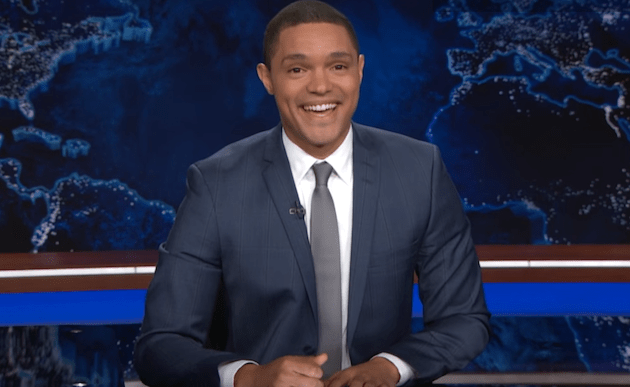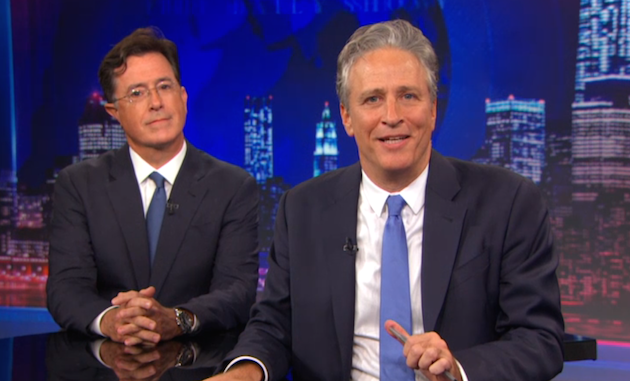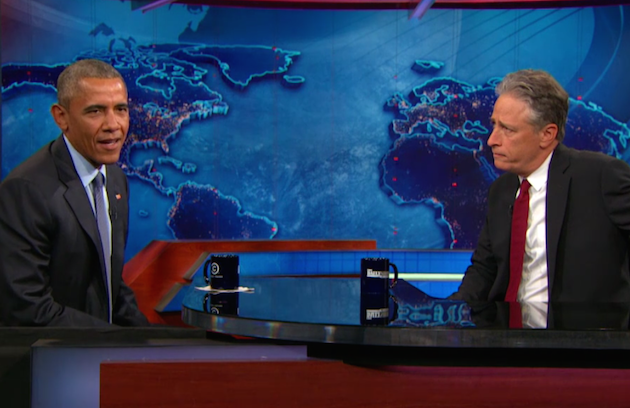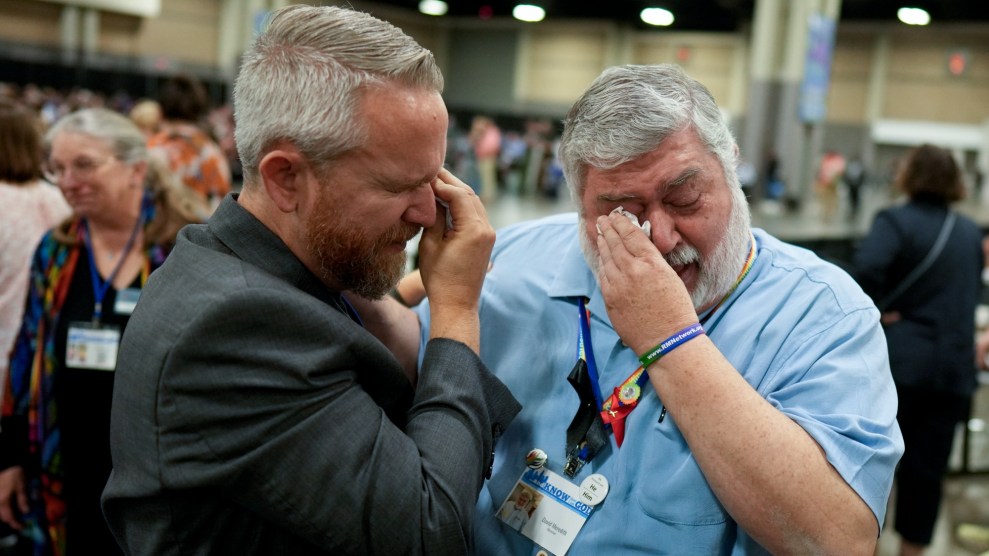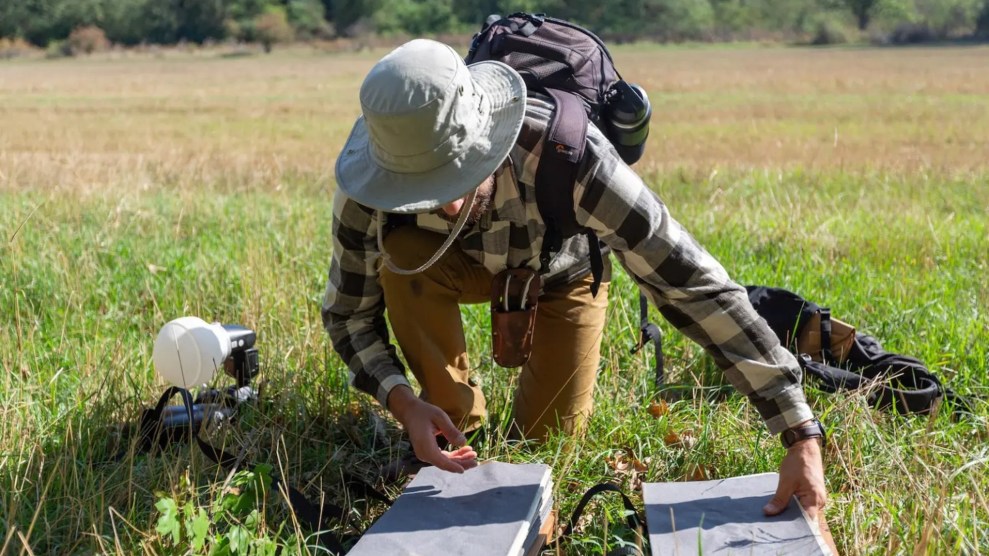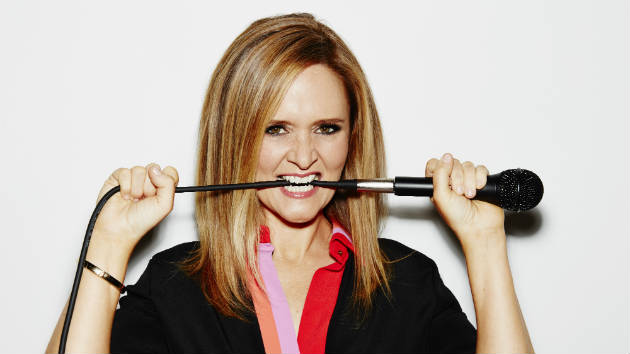
Peter Yang/TBS
Back in September, while at a pumpkin patch with her kids, Samantha Bee caught a glimpse of the late-night TV boys’ club in all its glory.
She saw a tweet with a photo from an October Vanity Fair story lauding the new era of late-night comedy. The spread featured household names—Colbert, Fallon, Conan, Kimmel, Oliver—as well as lesser-known hosts like James Corden and Larry Wilmore. Trevor Noah, who hadn’t yet debuted at The Daily Show, was also there. There weren’t, however, any women.
“It was like a troll job, for sure,” Bee now says. “and they were trolling the public.” So she instantly released a troll job of her own: a photoshopped image of her face on a centaur’s body shooting lasers out of her eyes. “BETTER,” Bee quipped on Twitter.
.@VanityFair BETTER pic.twitter.com/EfPbTQ3qZ8
— Samantha Bee (@iamsambee) September 14, 2015
Now, four months later, Bee is set to break into the fraternity: Her new show, Full Frontal With Samantha Bee, debuts Monday at 8 p.m. EST on TBS. And forget the typical dude-sitting-behind-a-desk late-night aesthetic—Full Frontal will feature a standing Bee riffing in front of a line of TV screens and throwing to on-location segments, covering everything from Syrian refugees in Jordan to the treatment of female US veterans.
We caught up with Bee leading up to the February 8 premiere to discuss satire and feminism, diversity in the workplace, and the rise of Donald Trump.
Mother Jones: You joined a predominantly male team at The Daily Show from a four-woman comedy troupe in Toronto. How did you manage that transition?
Samantha Bee: It wasn’t a gender concern for me. It was like, “Oh, I’ve just gone from having a relatively relaxing life and doing comedy at my own pace to suddenly sitting in a room with people whose work I’ve admired for years and years.” I definitely felt out of my league at first. Building a show once a month is vastly different from making a show happen every day with high-quality comedy. The pace was very fast, so your ideas get a hard “no” very fast. I just had to get used to that. I just had to get used to that pace. I didn’t know how to edit myself. You need to learn how to kill your joke babies right away if they don’t work, and that was a great lesson. I became a great editor of my own material. You’ve gotta have a lot of ideas, and it’s gotta happen fast.
MJ: You started at The Daily Show in 2003, after the start of the Iraq War. As a Canadian, how prepared did you feel commenting on American politics?
SB: We follow US politics quite closely in Canada. It was definitely something I was interested and motivated to follow. It was a part of my life keeping up with international stuff and keeping up with what was happening in the United States. I didn’t feel prepared. I didn’t know anything about American history, really. [Laughs.] I mean, not in an immersive way. So in no way did I feel prepared for how it would be. It’s that imposter syndrome when you sit around thinking, “Why would they hire me? Oh my God, when are they going to figure out that I shouldn’t be here?” I guess that they never figured it out. I got pretty lucky.
MJ: How do you think this current US election cycle would play out in Canada?
SB: Canadians, in general, are pretty awestruck by the kinds of character studies you get to do during a US election cycle. It’s been true for any election cycle I’ve been a part of, for sure. It’s such a circus, and it goes on forever. It’s a long, long process, whereas in Canada, there’s a set period of time within which to campaign and that’s all you have. You don’t have the kinds of funding. Canadians definitely watch it with their jaws on the floor. It’s inconceivable to any Canadian that Donald Trump would even be spoken of in the same breath as the office of the presidency. Inconceivable. As a dual citizen of the two nations, I’m still awestruck by it. [Laughs.]. I think we all are. I’m not able to go there yet. Not quite.
MJ: What do you miss most about your time at The Daily Show?
SB: Well, I miss Jon, for sure. But when I left, I left with having had such a full and complete experience that I don’t really miss it. I look back on those years with nothing but fondness. I enjoy making and building a new experience for myself, but anyone who I left there, I could still just call them. When it was finished for me, it was finished.
MJ: What are you happy to be done with?
SB: I will be excited to do a show one night a week. That’s perfect for me. Doing a scripted show is hard, hard work. It’s hard, physical, but we’re going to get there soon. It’s almost athletic. It’s mentally athletic. It’s physically athletic. It really breaks you down. That I will not miss. And also, I’m looking forward to being a host who’s just directing things.
MJ: What does it mean to become the only female late-night host on television?
SB: It’s really exciting for me. I think I would be doing this even if I wasn’t the only female in that space. There’s room for lots of voices. There’s certainly room for more female voices. It’s just the way it works out that my show is hitting the airwaves before anyone else. I think there will be more after me, so it definitely means a lot to me. But it’s not the only thing that means a lot to me. Just having the ability to fully express myself and fully drive a show is really the most exciting part of me. And I like all those guys tremendously. It’s just hard to imagine. When you think about the women who have come before me in that space, it’s such a small number of people. It’s really unthinkably small. I just don’t know why. I really don’t know why.
MJ: What, if anything, have you drawn from other women in the industry?
SB: I don’t think about it too much. Maybe that’s a bad thing, but for me, I can’t focus on what other people did. It’s better for me to drive forward. What I’m really trying to do is create a show that I would want to watch. That’s all I’m trying to do: Build a show that I think would be entertaining, and make a tiny little package with a bow on it and present it to people and hope that they like it too. I’m not taking on board too many thoughts of other people’s shows or traditions or anything like that. I can’t. I wrote a book, but I didn’t read other people’s books when I wrote my own book.
MJ: What was the big takeaway from that man-centric Vanity Fair photo spread?
SB: I think those guys are great, by the way. It’s not personal. It’s just that when you look at the photo, you really capture the fact that there are like a crazy number of male hosts in suits. [Laughs.] It’s not even a ratio. It’s an imbalance. The teeter-totter just toppled over. There’s nobody on the other side. I think everyone is just so tired of it. It’s one thing to know it, but that just created the perfect visual portrait of what it means to only have [male] late-night hosts. People just had an emotional reaction to it, and so did I. We were all in it together.
MJ: In a recent New York magazine story, the writer describes you as an “unapologetic feminist.” Is it important to you to bring that perspective to your work?
SB: I don’t think about whether it’s feminist or not feminist. I think about what the issues are going to be. I always have been a feminist. That’s how I grew up. We never really thought about it. It’s just the reality. I think my daughters are feminists. We don’t have to theorize about it too much. It just is. That’s how I feel. Somebody was asking me that question the other day, and I was like, “You know, would you not think that you can watch The Late Show because it’s hosted by a man? Would you wonder, would you sit and go, “Ugh, this is going to be all about man issues? Like, is there anything for me to watch in this show hosted by a man?” It’s strange to me that people would think that this show would be just strictly isolated to women’s issues. Like obviously, there are issues that I feel passionate about and want to be a part of it, but we can all handle it. Men and women can handle it as people.
MJ: Do you think there’s a difference between what makes men laugh and what makes women laugh?
SB: I don’t. I really don’t think there’s a difference. I don’t think there’s a difference at all in the things that we laugh at.
MJ: Why not?
SB: Because there’s no difference for me. I don’t laugh at jokes for women. My experience is different, I guess. But a good joke is a good joke. I’m picky about my jokes. I’m very critical about my jokes, and the material just has to win the day. You can do a themed piece on anything, but if the jokes don’t win the day, what’s the point? I have a really tough sense of humor, but I don’t have a gendered experience of laughing at things. People bring their own experience to the table, but I don’t think of it that way at all.
MJ: Your show—the writers’ room, the cast, the segments—is notably diverse. Why was that an emphasis for you?
SB: There’s so much lip flap devoted to creating diversity in the workplace, especially in the entertainment industry. I think we can all see that. We can see the direct realization of that. It’s just a fact. When you’re given the gift of being able to do your own thing, you can create the kind of workplace you want to create. I think we all benefit from hearing everybody’s stories. It makes our world better. It includes more voices. It includes more people’s stories. It makes life worth living, you know what I mean? I’m not interested in living in a bubble where I’m only entertaining people just like me, or I’m only singing to my own versions of myself. I love myself, but I think you can do better. [Laughs.]
Part of how you do better at diversity is you just hire people who are diverse. You make a point of it. You have to do it. It’s not going to change if people don’t actually just do it. You can do it, and it takes a little extra time. It takes more thought, and that’s what we are trying to do. I don’t even think we did a perfect job. I don’t think there is a perfect job, but we are absolutely putting our money where our mouths are.
Watch these choice clips from the premiere below, just in time for today’s New Hampshire primary:


